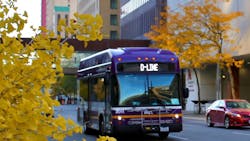Des Moines Area Regional Transit Authority launches 'Reimagine DART' initiative
In a collaborative effort, the Des Moines Area Regional Transit Authority (DART) and its governing body, the DART Commission, have launched an 18-month shared initiative to explore how public transit can meet communities’ needs and connect people to vital destinations across a growing region.
The planning process will continue DART’s efforts of responding to changing travel patterns, regional expansion and new technologies by taking on a new perspective on all the services DART should deliver and how to deliver them. As funding for public transit becomes tighter, the process will ensure that DART is maximizing resources to meet the region’s priorities for public transit over the next decade.
“DART was created by visionary leaders in 2006 as the regional solution for residents to travel between our communities,” said Amanda Wanke, DART CEO. “We have provided an essential service for residents to get to places that allow them to thrive and contribute to our communities, but a lot has changed over 18 years. Our region looks significantly different from where people live to how they work. While we continue to adapt our services, now is the right time to define a shared vision and roadmap for how public transit can support Greater Des Moines' future growth.”
Starting this fall, the DART Commission will set the goals and measures of success DART should achieve. A transit consulting team, in collaboration with DART staff and the DART
Commission, will use the goals to determine the types of services DART should provide and how to best deliver those services. The public will have opportunities to provide input throughout the process to inform decisions.
By December 2025, the DART Commission is expected to vote on final recommendations for a network redesign, ahead of when it will decide DART’s Fiscal Year 2027 budget. DART staff will then begin implementing the new service network in summer 2026.
“Reimagine DART is a unique opportunity to decide how public transit can continue to
strengthen and connect our communities as other cities near us are increasing their
investment in transit,” Wanke said. “With finite resources, DART cannot provide enough
service to meet all of the needs of a diverse region, but we hope this community-informed process will help us decide how our transit system can continue to drive an
inclusive and flourishing region for the future.”
